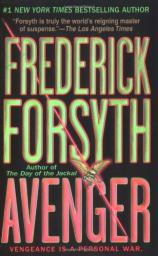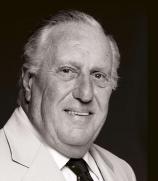Avenger
Review
Avenger
It's hard to believe that it has been over 30 years since Frederick
Forsyth wrote THE DAY OF THE JACKAL. It wasn't long after that book
was published that the world learned there really was a Jackal and
that, contrary to the ending of Forsyth's work of fiction, he was
not killed moments after failing to assassinate Charles de Gaulle,
but actually was still out running around. Forsyth's subsequent
novels have accordingly been treated as if they are treatises
concerning the hidden history of the world. AVENGER is no
different, and while it may be a work of fiction, the foundation
upon which it is written is chillingly real.
Forsyth spends a good deal of time --- almost the first third of
the book --- setting his characters in space and time. As a result
there is initially a great amount of jumping around. A lesser
writer would have lost the thread of the narrative, and indeed
Forsyth is almost a victim of his own cleverness.
Part of the gambit involves an idealistic American youth, fresh out
of college, who joins a non-government humanitarian relief effort
in war-torn Serbia and is casually tortured and murdered by a band
of anonymous marauding outlaws led by a violent and dangerous
psychopath who seems to have vanished after the deed was
done.
The victim's grandfather, a self-made millionaire, seeks that which
is almost impossible to obtain: justice. He wants his beloved
grandson's killer brought to the United States and tried for murder
before a court of law. For this, he is placed in contact with a man
known only as Avenger.
Avenger is Pete Dexter, a former "tunnel rat," the name given to an
elite team of American soldiers who conducted seek-and-destroy
missions in the network of enemy tunnels utilized during the
Vietnam War. Forsyth takes his time explaining what Dexter did, and
who he was, just so that we can get an idea of what sort of skills
he brings to the table as Avenger.
Dexter now lives quietly, practicing law in a small town in
Pennsylvania and giving no clue to his past nor to his occasional
work as a highly skilled, highly paid mercenary. There is no smooth
way to set all of this up, and at times the narrative almost
becomes awkward as it jumps back and forth. Every word of this
tale, however, is so interesting that reading it is like being
swept down rapids --- you're moving so fast and the trip is so
thrilling that the occasional bump becomes an expected part of the
ride.
Nothing though prepares the reader for what the beginning of
AVENGER portends. Forsyth is a master gamesman and he sets up a
situation whereby it becomes vitally important to the safety and
security of the United States that Avenger does not complete his
mission. The reader is accordingly on tenterhooks, hoping by turns
that Avenger does the job he has been retained to do in order to
redress a horrible wrong, yet wishing that those aligned against
Avenger will prevent him from doing so.
What makes this all the more interesting is that the reader will
already know, long before the last page, that Avenger is
successful. Forsyth has utilized this technique before. In THE DAY
OF THE JACKAL, for instance, everyone knew that the Jackal would
fail in his attempt to assassinate Charles de Gaulle. The
intriguing aspect of the book was in discovering how he would
fail.
The mirror element in AVENGER concerns how Avenger will succeed in
his own mission, not only with respect to locating his target, but
also with respect to abducting him from a seemingly impenetrable
fortress and bringing him back to the United States. The answer
will keep you reading --- and thinking --- long into the night. But
there is more to AVENGER than this intriguing, suspenseful plot.
Forsyth sets up a backstory that has so much relevance to today's
headlines that after reading AVENGER you'll be unable to watch or
read the news without thinking of this novel.
AVENGER will not only introduce Forsyth to a new generation of
readers but will also have his audience, both old and new,
repeatedly revisiting his already extensive bibliography. This is a
title to read, discuss and analyze.
Reviewed by Joe Hartlaub on January 21, 2011





